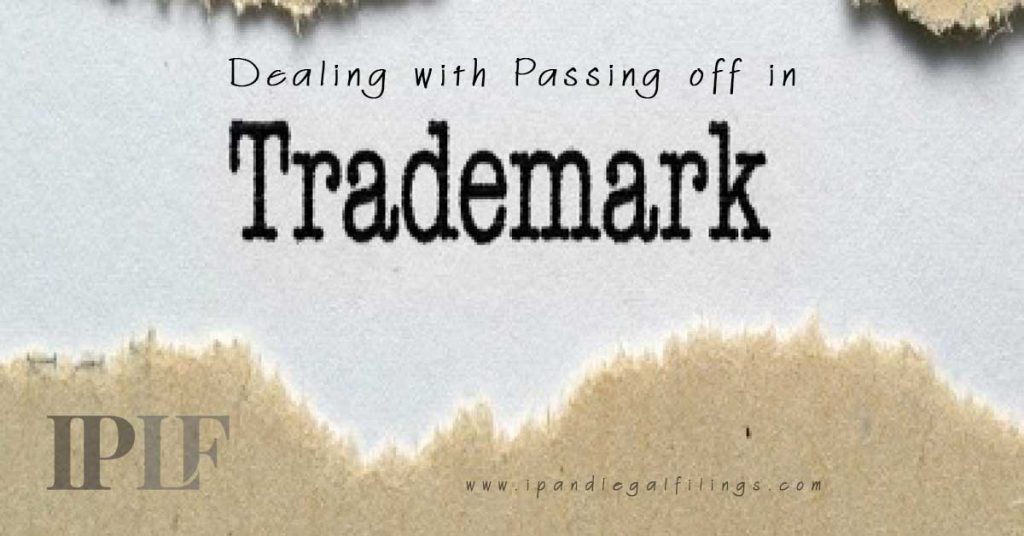Understanding Passing-off in Trademark
Passing off in the trademark is a less familiar form of intellectual property rights. When we talk about the trademark, we tend to see provisions that speak about stating the infringement portion of the trademark. Being in the provision, it becomes an easier and much familiar part to be dealt with. With the growing trend to file trademarks and more businesses becoming very cautious regarding securing their brand, the passing-off issue needs to be understood in this domain. Because even if with no such statutory provision, it becomes a very valuable asset for the business and it should be understood for effective protection that can be taken.
Read Also – Explore Essential Attributes of a Criminal Defense Lawyer

This is clear that there is no such statutory provision that speaks of compulsory registration of the trademark or even the copyright. When one starts using a mark, he owns that mark until and unless that mark infringes on someone else’s mark that is already in the public domain. If an already registered mark is there, then it becomes pertinent to understand that one will be liable for infringement despite the unregistered mark. But in case, the mark does not infringe on someone else’s mark, then even an unregistered mark can be protected via passing off. The issue with passing off seems to be very appealing and sometimes confusing as well. A mark without getting registered at the TM office, while being infringed can seek protection through passing off is a lucrative incentive. The value of TM is enormous where it represents the brand value of the company. In this case, the protection of the same becomes increasingly important. And just because the owner has not registered the trademark, he should not be deprived of the right of protecting his mark if he has prior use. Nevertheless, the owner must never rely on the passing off and must at once register the mark. The registered mark is always more powerful than the unregistered one. Therefore the passing off must only be used as a substitute and must not be solely relied upon.
Read Also – Trademark infringement – Trade Marks Act, 1999
Getting into Passing off
If there is a business that uses the mark that someone else is already using, thereby making it a deceptively similar mark and leading to confusion in the mind of the consumer, the exact thing will lead to the representation of the right of someone else’s marks. Despite being using the non-registered mark, it is misleading the consumer, and hence the use of the same mark will be an infringement under passing off. The use of the mark will also affect the reputation of the said business, despite that the business uses an unregistered mark.
Read Also – 5 Common Questions about Trademark Searches
Elements for Passing off
Generally, there are three major elements that are used to prove the case of passing off. These three elements are also called “classical trinity”. The first element is the establishment of goodwill and the reputation that the company/owner holds. Such goodwill and reputation come with the recognition that the entity must be holding. The second element is proving the misrepresentation that the company must be holding. In this, the misrepresentation must be in such a sense that results in misleading the public. Third and the important part is the establishment of damage that has been occurred due to such activity. These three elements must be proved in the court of law if the case of passing off arises.
Read Also – What is Trademark?
Goodwill is an inherent part of the business. Most entities depend upon goodwill for attracting the customer base. Having goodwill attracts the customer and the customer recognizes the services or goods of the entities. Through this goodwill, the ability to persuade the customer is inherently being involved. It is important to understand that only seeking the reputation is not important but more important is to have the requirement of trade. The customer knowing that origin of the goods and services is not sufficient until it is proved that there has been appreciable trade.
Read Also – An Introduction to Intellectual Property Laws
The entity needs to prove that a misrepresentation has taken place which is likely deceiving the public in terms of goods and services. One needs to understand that a mere confusion that leads to a sale is not sufficient and it is necessary to be proved that the consumers are deceived. It means that the consumer believes that the goods are those of that entity and it is not only mere confusion. Lastly, an important part is to prove that damages have been suffered. The damages must directly link to the misrepresentation part. The entity must prove that it is only due to the usage of the mark by the said party that the entity has incurred loss to the public. Also, the entity can prove that the loss that occurred has been due to the loss of goodwill.
Author: Saransh Chaturvedi an associate at IP & Legal Filings, in case of any queries please contact/write back to us at support@ipandlegalfilings.com.
Try our Debt Resolution solutions today Request a Demo